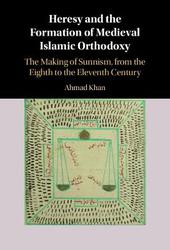
|
Heresy and the Formation of Medieval Islamic Orthodoxy: The Making of Sunnism, from the Eighth to the Eleventh Century
Hardback
Main Details
| Title |
Heresy and the Formation of Medieval Islamic Orthodoxy: The Making of Sunnism, from the Eighth to the Eleventh Century
|
| Authors and Contributors |
By (author) Ahmad Khan
|
| Physical Properties |
|
| Category/Genre | History of religion
Islam |
|---|
| ISBN/Barcode |
9781009098373
|
| Classifications | Dewey:297.0902 |
|---|
| Audience | | Professional & Vocational | |
|---|
| Illustrations |
Worked examples or Exercises
|
|
Publishing Details |
| Publisher |
Cambridge University Press
|
| Imprint |
Cambridge University Press
|
| NZ Release Date |
31 January 2023 |
| Publication Country |
United Kingdom
|
Description
Between the eighth and eleventh centuries, many defining features of classical Sunni Islam began to take shape. Among these was the formation of medieval Sunnism around the belief in the unimpeachable orthodoxy of four eponymous founders and their schools of law. In this original study, Ahmad Khan explores the history and cultural memory of one of these eponymous founders, Abu Hanifa. Showing how Abu Hanifa evolved from being the object of intense religious exclusion to a pillar of Sunni orthodoxy, Khan examines the concepts of orthodoxy and heresy, and outlines their changing meanings over the course of four centuries. He demonstrates that orthodoxy and heresy were neither fixed theological categories, nor pious fictions, but instead were impacted by everything from law and politics, to society and culture. This book illuminates the significant yet often neglected transformations in Islamic social, political and religious thought during this vibrant period.
Author Biography
Ahmad Khan is Assistant Professor of Islamic Studies at the American University in Cairo. He previously held positions at Oxford and Hamburg universities and was the Arcapita Visiting Professor at Columbia University in New York. His publications include Reclaiming Islamic Tradition: Modern Interpretations of the Classical Heritage (2016). His research focuses on Islamic thought and history in the pre-modern and modern periods.
Reviews'In important parts of the Middle East and South Asia's vast Sunni Muslim population, Islam and the school of practice initiated by Abu Hanifa have long been nearly synonymous. However, for the medieval clerics who first spoke of 'Sunni Islam', Abu Hanifa was a heretic. This rich and careful study details how Sunni Islam expanded to admit Abu Hanifa and the broad diversity of thought and practice found in the Muslim world today.' Jonathan A.C. Brown, Georgetown University 'With mastery of a wide range of sources, clarity of expression and methodological insight, Ahmad Khan guides us through the intricate ways in which accusations of heresy were constructed during the early Islamic period, the defensive reactions they provoked and how such processes contributed to the emergence of classical Sunnism.' Maribel Fierro, Spanish National Research Council 'This is a highly original and important study which challenges many assumptions about how ideas around heresy and orthodoxy were articulated by early Sunnis. The book is deeply researched, and its nuanced arguments are supported by an impressively wide range of sources. The conclusions have significant ramifications for the field.' Harry Munt, University of York
|